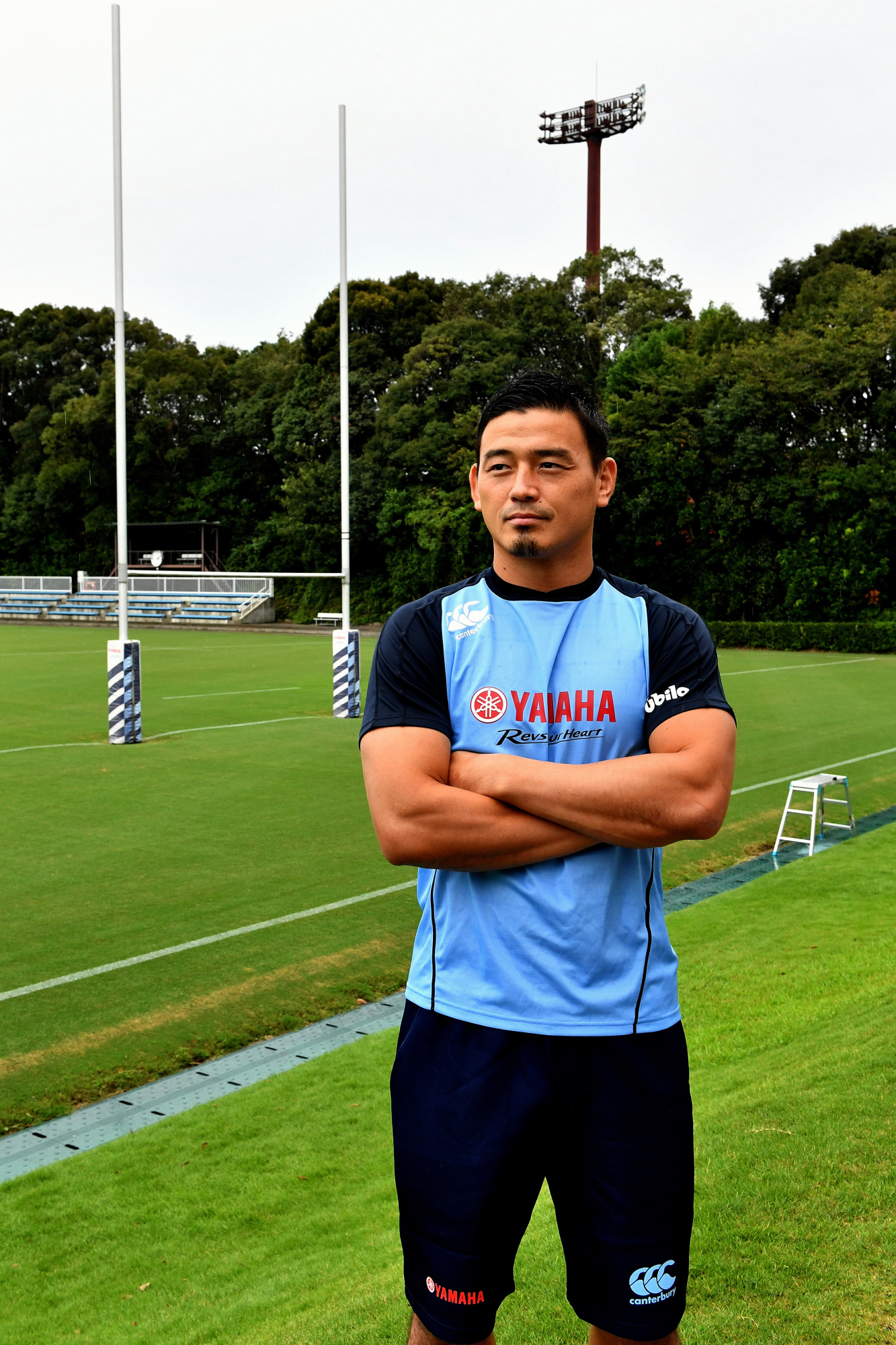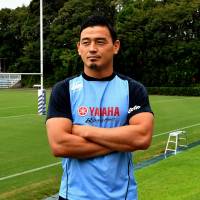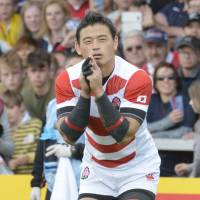Rugby icon Ayumu Goromaru is deeply concerned with the status quo surrounding his sport since the Japan's national team's sensational World Cup campaign in 2015.
"Frankly speaking, as a player I feel very irritated," said Goromaru, a fullback for the Top League's Yamaha Jubilo, in an exclusive interview with The Japan Times at the team's clubhouse last week. "It excited people a lot and brought them to the stadiums (after the World Cup), but it did not continue.
"Of course, when you have a World Cup that was as great as it was (for Japan), I can understand that the excitement would eventually settle back down. But the popularity has dropped too quickly. I think that the situation is going back to what it was before the World Cup (in 2015)."
Average attendance for the Top League reached 6,470 in the 2015-16 campaign, the season that followed the World Cup, but dropped to 5,059 the following year and 5,688 last season. The average attendance for the Sunwolves, who made their Super Rugby debut in 2016, has taken on a similar trend.
The success and spotlight Japan enjoyed throughout the 2015 tourney were what those associated with rugby had craved for a long time.
Although they fell short of making the knockout stage, the Brave Blossoms stunned the world by defeating powerhouse South Africa 34-32 in their opener and successfully racked up two more wins in the pool stage. Japan had competed in every World Cup since the first in 1987, but amassed just one win before the 2015 edition.
After watching his country be smashed by international opposition in past World Cups as a boy, Goromaru admitted he could never have imagined such performance by Japan during the tournament.
Hard work led to 2015 success
The Brave Blossoms did not perform as well as they did on the field by accident. Led by head coach Eddie Jones, it began its preparation in 2012 through lengthy, hard-edged training camps.
For a team that had only managed to collect one win in the previous seven World Cups, that was the sort of effort Japan needed in order to reach its lofty goal at the 2015 tourney: reaching the quarterfinal round and putting itself on the global rugby map. But Goromaru maintains the sacrifice was worth paying for.
" 'Eddie Japan' started in 2012 and we posted wins over Wales and Italy (in 2013 and 2014, respectively)," the 32-year-old said. "Nevertheless we didn't get much attention either in or outside of Japan. We worked unbelievably hard and kept trying to improve, but the players were all frustrated by the lack of coverage surrounding the team."
Then came the 2015 World Cup. Japan's success, in particular the jaw-dropping victory against South Africa, removed the chip from the players' shoulders as they instantly became the darlings of international rugby.
Next year, the spotlight will firmly be on Japan during what will be the first World Cup held outside of the traditional powerhouse rugby countries as well as the first in Asia.
A missed opportunity
But Goromaru, who became the all-time leading scorer of the Top League in this season's opening round, is unhappy with the slow growth in rugby's domestic popularity.
"Unlike baseball and soccer, this is an amateur sport, so it's difficult in some ways to attract attention," he lamented, before expressing his hope more Japanese citizens fall in love with the sport as a result of the tournament.
Goromaru became the biggest household name in Japanese rugby in part due to his unique pre-kicking routine, which became known as the "Goromaru pose."
"It was a strange feeling," said Goromaru, who was named to the Dream Team of the 2015 tournament. "It wasn't what I personally hoped for. You have 15 players on your side and it is a sport in which you can earn a win when each player does his role.
"I understand it to an extent, because (my popularity) gave the sport attention (in Japan)."
But Goromaru regrets that Japanese media focused more on his pose and his unusual family name than his team's performance.
"I wanted (the media) to dig more into the fact that a weak team like us posted a win over a team like South Africa, which has won the World Cup twice," he stated.
Establishing a legacy
After "drawing a line" between himself and the national team, Goromaru is uncertain if his successor has appeared to become the public face of Japanese rugby.
"We will have the World Cup in Japan, and hopefully people will get to see different players and more (Japanese) players will perform well," said Goromaru, who added he looks forward to observing what will be a true sports culture during the World Cup, 2020 Tokyo Olympics and Paralympics and 2021 World Masters Games in Kansai.
As much as Goromaru wants Japanese citizens to root for the Brave Blossoms, he also hopes that they will enjoy the World Cup atmosphere, citing it as a rare opportunity to embrace the cultures of the 19 other participating nations.
According to the player, students at several elementary schools in Fukuroi, a city set to host four matches including Japan-Ireland at Shizuoka Stadium Ecopa, are learning and researching the cultures of the countries that will compete there. He believes that it will be a memorable experience for the students.
"The World Cup lasts just a month and a half by itself," Goromaru said. "But what those children study will be theirs the rest of their life. I would like people to appreciate the World Cup like that."
Although we will no longer see him don the national team jersey, which is often referred as sakura no jersey (jersey of the cherry blossom), Goromaru remains the team's biggest supporter and hopes it can achieve what the 2015 squad was unable to do — reach the final eight — at next year's extravaganza.
He believes that much of the team's development in the run-up to the marquee event can be attributed to the Sunwolves facing tough competition in Super Rugby.
Japan, a Tier 2 nation, has boldly attempted to improve itself by facing several Tier 1 teams such as France, Wales, Scotland and Italy. It will host three-time World Cup winner New Zealand in Tokyo on Nov. 3 and travel to play England on Nov. 18.
"We've got to come up with better results at the World Cup, so we need to keep challenging in order to have good results. That's our stance," emphasized Goromaru, who previously played for the Queensland Reds of Super Rugby and RC Toulon of the French Top 14. "That, I think, is a very positive thing."



















With your current subscription plan you can comment on stories. However, before writing your first comment, please create a display name in the Profile section of your subscriber account page.